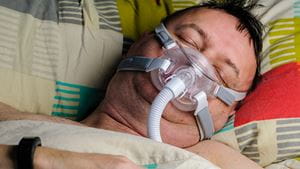
For many people, loud snoring can be one of the more frustrating parts of sleeping next to another person. One of the most common treatments for snoring, especially when it causes a person to pause their breathing, is using a CPAP machine.
While CPAC devices do work for the vast majority of patients, some people can have difficulty wearing them for a number of reasons. As a result, people look for alternatives to the machine. Since April 2023, online searches for mini CPAP and micro CPAP devices have risen significantly.
James Murray, DO, is a pulmonologist and sleep specialist with Unity Pulmonary Medicine in Greece and explains how CPAP machines work, the idea behind micro CPAP devices, and trusted recommendations for treating sleep apnea.
CPAP machines use mild air pressure to keep a person’s airway open for breathing while they sleep. The person using the device wears a mask or nose piece that is connected to a hose, which is hooked up to the CPAP device next to the person’s bed.
While CPAP devices are a highly effective treatment for obstructive sleep apnea, they can be challenging for some patients. Some of those issues include:
“Historically, approximately 75 percent of the patients in our practice that we prescribed CPAP end up as good long-term users,” Dr. Murray said. “This also means that 25 percent of patients with CPAP either struggle with use or do not feel enough of a compelling benefit to use it over the long term.”
Micro CPAP devices are promoted as being a less invasive and more comfortable alternative to traditional CPAP devices. Instead of using a large motor to create a flow of pressurized air (as a standard CPAP machine does), a micro CPAP device uses hundreds of tiny fans to drive air into the device and produce a stream of pressurized air that travels through the nasal passage and into the upper airway.
The confusion, according to Dr. Murray, is that these devices do not create anything that functions as a CPAP device. Ultimately, because these devices do not create a continuous positive airway pressure, they do not effectively treat sleep apnea. For these reasons, a true micro CPAP device is not yet available for sale – and not available for review, study, or evaluation.
“There is not a lot known about true ‘micro-CPAP’ devices,” Dr. Murray said. “They are not approved by the FDA, nor is there a rich amount of data on how effective they are for patients, how safe they are, or other data that might be traditionally obtained through clinical trials.”
For patients who are looking for alternatives to CPAP machines, there are a number of other choices that are recommended by pulmonary experts.
Lifestyle changes: This is often suggested as a first way of changing sleeping habits. Weight loss, avoiding sedatives, and not sleeping on your back are all recommended as methods of helping to improve sleep.
Mandibular advancement devices: These devices that are made by a dentist and placed in the mouth to push or pull the lower jaw in a way that creates more room in the back of the throat.
Hypoglossal nerve stimulation: A relatively new form of therapy, hypoglossal nerve stimulation uses a device to send a small electrical pulse to a nerve located under the tongue. This pushes the tongue forward and opens the patient’s airway, allowing them to breathe easier.
If a provider determines someone is eligible for this therapy, the patient will undergo a brief procedure to place the device.
Surgery: This is very rarely recommended, but on some occasions, pulmonary experts may suggest undergoing surgery for the nasal cavities, jaw, tongue, or throat.